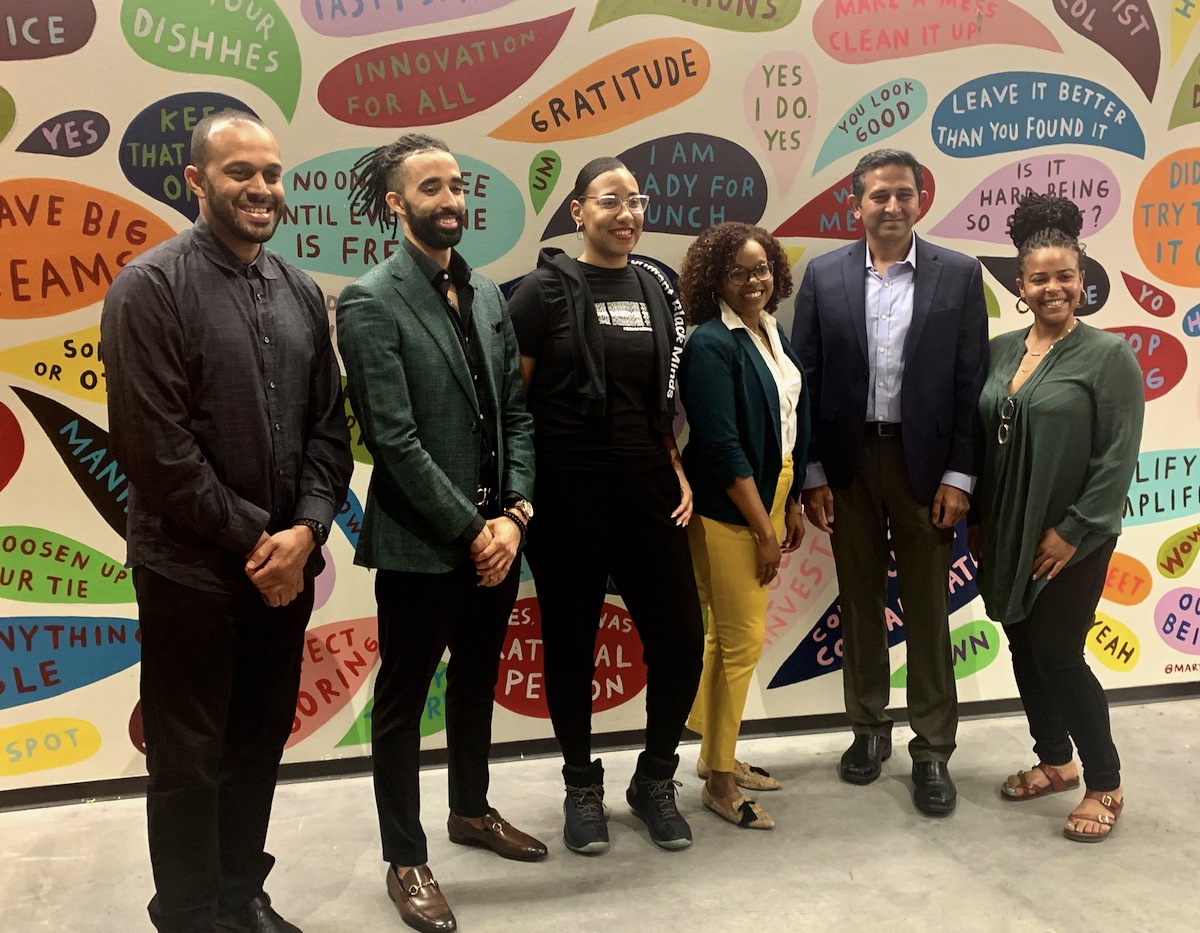The seven Black and brown startup founders gathered in an intimate room at University City’s Quorum to connect with each other, and to pitch local investors for the chance at thousands of dollars. With prizes ranging from $5,000 to $25,000 from CBK Ventures, the event had a goal of boosting Philly’s underrepresented and underfunded founders, and was a collaboration between 1Philadelphia, Coded by Kids, Plain Sight Capital, and the City of Philadelphia.
Mobley, the person at the helm of the first three organizations, reflected on the diversity represented in the room Tuesday night.
“I started in tech in 2001, and I took my wife on our third or fourth date to an event at Quorum — really setting the tone for the relationship,” he joked during his remarks. “But the room did not look like this. This is what we do. It takes hard work. It’s not a one-off event. It’s been nine years of hard work and dedication from our team. But when you look around, remember this is impact. Tech events when I started 20 years ago did not look like this. Remember that.”
The pitches
Ten judges heard each of the founders’ three-minute pitches, with three more minutes for questions. They included Blessy Thomas of Innovate Capital Growth Fund, Omar Menchin and Jonathon Beschen of Ben Franklin Technology Partners, Antonia Dean and Laura Plunkett of Comcast, Jason Ray of Zenith Wealth Partners, Rudy Ellis of Switchboard Live, entrepreneur Diegane Dione, Justice Miranda of Cxmmunity and Keith Leaphart of Philanthropi.
First to present was Cody Eddings, cofounder of SnapRefund, the payments platform designed to get insurance payouts to customers faster. The startup serves the traditionally underbanked, among those are many gig or freelancer workers, and new funding would go toward platform updates and go-to-market strategy, he said.

SnapRefund’s cofounders Anis Taylor (left) and Cody Eddings. (Courtesy photo)
Your Care Collective, founded by Joelle Tolifero to serve independent workers and organizations to increase their wellbeing, went next. The B2B2C platform was founded to help employees and companies save money on the healthcare costs associated with burnout, and was seeking the funds to build out the platform and grow its community.
She was followed by Amy Felix from TrackCE, a mobile app to allow doctors and nurses to keep their education and certification credentials in one place. The team has just launched their MVP to 20 users with the hopes of hitting 60 before a launch to the public.
Ike Okonkwo, cofounder of Welltrip, a marketplace for peer reviewed beauty and spa services abroad, presented fourth. Black women spend about 80% more on beauty services than their white counterparts, the founder said, and the company’s aim is to make trustworthy vendors available while traveling. The company is planning on launching an ambassador program and charges 17.5% on services for its profit.
Next up was Chris Ferrer, founder of SuChef, a platform that allows a diverse set of chefs monetize their recipes and cooking content. The platform offers a free and paid subscription model to access curated cooking and grocery content.
Harry Michel, cofounder of Locus Mobility, pitched the platform that revamps how car ownership works. The platform automates the services and payments associated with car ownership so that owners can think less about their maintence and reoccurring costs.
“If you own a car, you know … vehicle ownership sucks,” Michel said.

Shannon Morales. (Courtesy photo)
Last up was Shannon Morales, founder of diverse tech talent hub Tribaja. The organization is behind events like the Diversitech Summit, and aims to connect technologists and people of color to tech jobs. With the pitch money, Morales was looking to build out another piece of the platform to do virtual experience certifications and get her community members into jobs faster. Tribaja did $243,000 in revenue last year and was slated to hit $750,000 upcoming, she told the judges.
The winners
After questions and deliberations, the judges handed down prizes. Third place and $10,000 went to healthtech app TrackCE, and second place was payments platform SnapRefund with a $15,000 prize.
Tribaja’s Morales was announced the grand prize winner of $25,000 — a solid start as she begins raising venture capital this year, something the founder said she never thought she’d do.
“I never anticipated raising a round before because of the barriers for women of color, I was just like, ‘No, we’ll bootstrap it.’ I came in to Tribaja with that mindset that nobody else was going to give me money,” Morales said. “But I went out there and secured, so I think that’s why I’ve been able to do so much. I never thought having outside funding was an option.”
The company is reaching capacity with how much they’re able to do now; Morales works with a team of seven contractors, but is the only full-time employee. With the employers and partners interested in working with Tribaja, she’s excited to bring on some professionals full time, and work on the platform’s technology.
“So now, thinking about motivation of where we are and where we want to be, it feels attainable,” Morales said.
Emerging Idea awards and $5,000 each also went to earlier-stage startups Art Rize and Dyneri.
Woke up this morning feeling EXCITED about the future of #phillytech and #startups. 🎉Congrats to the WINNERS from last night’s #pitch competition. In total, we awarded $60K in 5 companies last night – 3 current startups and 2 emerging ideas. The winners are: 🧵 pic.twitter.com/ijX8JFUzpm
— Coded by Kids (@codedbykids) April 27, 2022
Join the conversation!
Find news, events, jobs and people who share your interests on Technical.ly's open community Slack

Philly daily roundup: A better coffee supply chain; Philly Tech Week returns; Apply to Pennovation Accelerator

Philly daily roundup: Startups want office culture; New Venture Lab cohort; Penn Med's new AI leader

Will the life sciences dethrone software as the king of technology?


